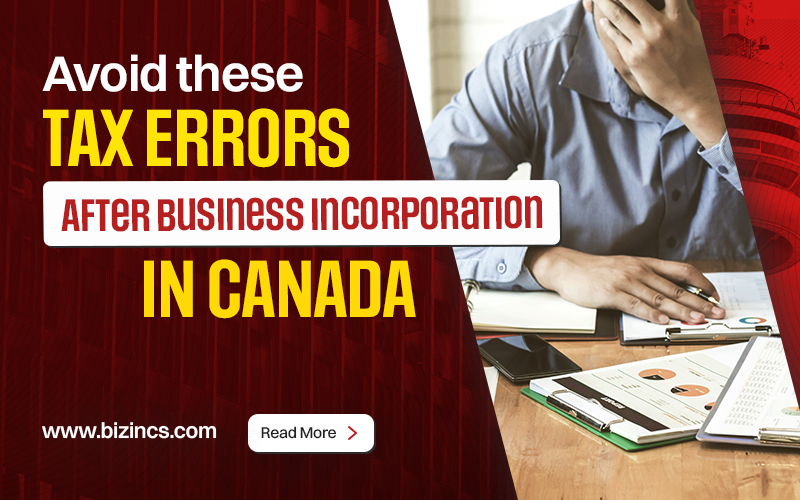Avoid These Tax Errors After Business Incorporation in Canada
Starting a new venture opens the door to exciting possibilities and important responsibilities.
Many entrepreneurs choose business incorporation in Canada for various benefits. This strategic move offers legal protection and potential tax advantages. However, it also introduces complex tax obligations for owners.
Navigating these new rules can be challenging and often confusing. Understanding common pitfalls is crucial for long-term success. Avoiding these errors ensures compliance and financial stability.
This guide highlights key tax mistakes to prevent. It helps your newly incorporated entity thrive successfully.
Misunderstanding Corporate vs. Personal Taxes
A primary error after business incorporation in Canada involves tax distinction. Many new owners confuse corporate income with personal income. Your corporation is a separate legal entity. It has its own distinct tax obligations.
Profits earned by the company belong to the company. They are not automatically yours personally. You draw income from the corporation through salaries or dividends. These personal earnings are then subject to individual income tax.
Failing to separate these can lead to significant issues. It often results in incorrect tax filings. Always maintain clear boundaries between finances. This separation is fundamental for proper taxation.
Neglecting Proper Record-Keeping
Diligent record-keeping is absolutely paramount for any business. After business incorporation in Canada, this becomes even more critical. Every financial transaction must be meticulously documented.
This includes all revenues, expenses, and asset purchases. Poor records make accurate tax filing nearly impossible. The Canada Revenue Agency (CRA) demands detailed documentation.
They often request these records during an audit. Incomplete records can lead to reassessments and penalties. Implement robust accounting systems from the start. Digital solutions can greatly simplify this process.
Organized records save time and reduce stress. They also demonstrate due diligence to authorities.
Missing Tax Deadlines
Deadlines are non-negotiable in the world of corporate taxation. After business incorporation in Canada, you face new filing dates.
Corporate income tax returns are due six months after year-end. However, taxes payable might be due earlier. Missing these critical deadlines incurs hefty penalties.
Interest charges also accrue on overdue amounts. Consistent late filing can trigger CRA scrutiny. Set up reminders for all important dates. Consult a tax professional for a clear schedule.
Proactive planning prevents costly oversights. Timely submissions reflect responsible management practices.
Incorrectly Claiming Expenses
Claiming business expenses correctly is a common challenge. After business incorporation in Canada, rules can seem complex. Only legitimate business expenses are deductible.
Personal expenses must never be mixed with business costs. Common errors include claiming personal meals or travel. Vehicle expenses also require careful calculation.
Ensure you have receipts for every single expense. Documentation supports all your claimed deductions. Incorrect claims can lead to disallowances. They may also result in penalties and interest.
Understand what qualifies as a deductible expense. Seek professional advice when in doubt.
Ignoring Payroll Deductions
If your corporation has employees, payroll deductions are mandatory. This applies even if you are the sole employee after business incorporation in Canada.
You must withhold income tax, CPP, and EI. These amounts are then remitted to the CRA. Failing to remit these deductions is a serious offense.
It can lead to severe penalties and legal consequences. Directors can be held personally liable for unremitted amounts. Set up a proper payroll system immediately.
Ensure timely and accurate remittances always occur. This protects both the company and its directors.
Failing to Remit HST/GST
Many businesses collect Harmonized Sales Tax (HST) or Goods and Services Tax (GST). After business incorporation in Canada, you must register if taxable revenues exceed $30,000.
Once registered, you must collect and remit this tax. Failing to remit collected HST/GST is a significant error. The CRA takes these omissions very seriously. Penalties and interest apply to unremitted amounts.
Consistent non-compliance can lead to severe actions. Understand your HST/GST obligations thoroughly. File your returns and remit payments on time. This ensures your business remains compliant.
Improper Shareholder Loan Management
Shareholder loans are common but often mismanaged. After business incorporation in Canada, you might lend money to or borrow from the company. Loans to shareholders must be repaid within one year.
Otherwise, they can be deemed taxable income. Loans from shareholders should be properly documented. They should also accrue reasonable interest if applicable. Mismanaging these loans creates tax complications.
It can trigger unexpected personal tax liabilities. Always formalize shareholder loan agreements. Consult an accountant for proper structuring. Clear documentation prevents future disputes.
Overlooking Scientific Research and Experimental Development (SR&ED)
Canada offers generous SR&ED tax incentives. Many eligible businesses overlook these valuable credits. After business incorporation in Canada, assess your activities carefully.
If you conduct research or development, you might qualify. This program provides significant tax refunds or credits. It supports innovation and technological advancement. Document all eligible activities meticulously.
This includes time spent, expenses, and project details. Failing to claim SR&ED is a missed opportunity. It leaves significant money on the table. Consult a specialist for SR&ED claims. They can help maximize your potential benefits.
Not Planning for Taxable Benefits
Providing benefits to employees can create taxable benefits. This includes company cars, health plans, or housing. After business incorporation in Canada, understand these implications.
The value of these benefits is taxable income. It must be included on employee T4 slips. Failing to report taxable benefits correctly is an error. It can lead to reassessments for employees and the corporation.
Ensure all benefits are properly valued. Report them accurately on payroll and tax forms. Clear understanding avoids future complications. This ensures compliance with CRA regulations.
Inadequate Tax Planning Overall
Many new corporations focus solely on operations. They often neglect comprehensive tax planning strategies. After business incorporation in Canada, proactive planning is essential.
This includes salary versus dividend planning. It also involves income splitting opportunities. Strategic tax planning minimizes your overall tax burden. It helps retain more capital within the business.
Waiting until year-end is often too late. Regular reviews with a tax advisor are recommended. A good plan adapts to changing circumstances. It optimizes your financial position continuously.
Conclusion
Successfully managing taxes after business incorporation in Canada requires diligence. It demands a clear understanding of your new responsibilities. Proactive measures can prevent costly mistakes. Implement robust record-keeping practices immediately. Stay informed about all tax deadlines.
Ensure accurate reporting of all income and expenses. Seek professional guidance from qualified accountants. They provide invaluable support and expertise. Regular consultations help you navigate complexities. They ensure your business remains compliant and prosperous.
Protecting your incorporated entity is paramount. This careful approach secures your financial future. It allows you to focus on growth.
Confused about your tax responsibilities? Bizincs can simplify it for you.







